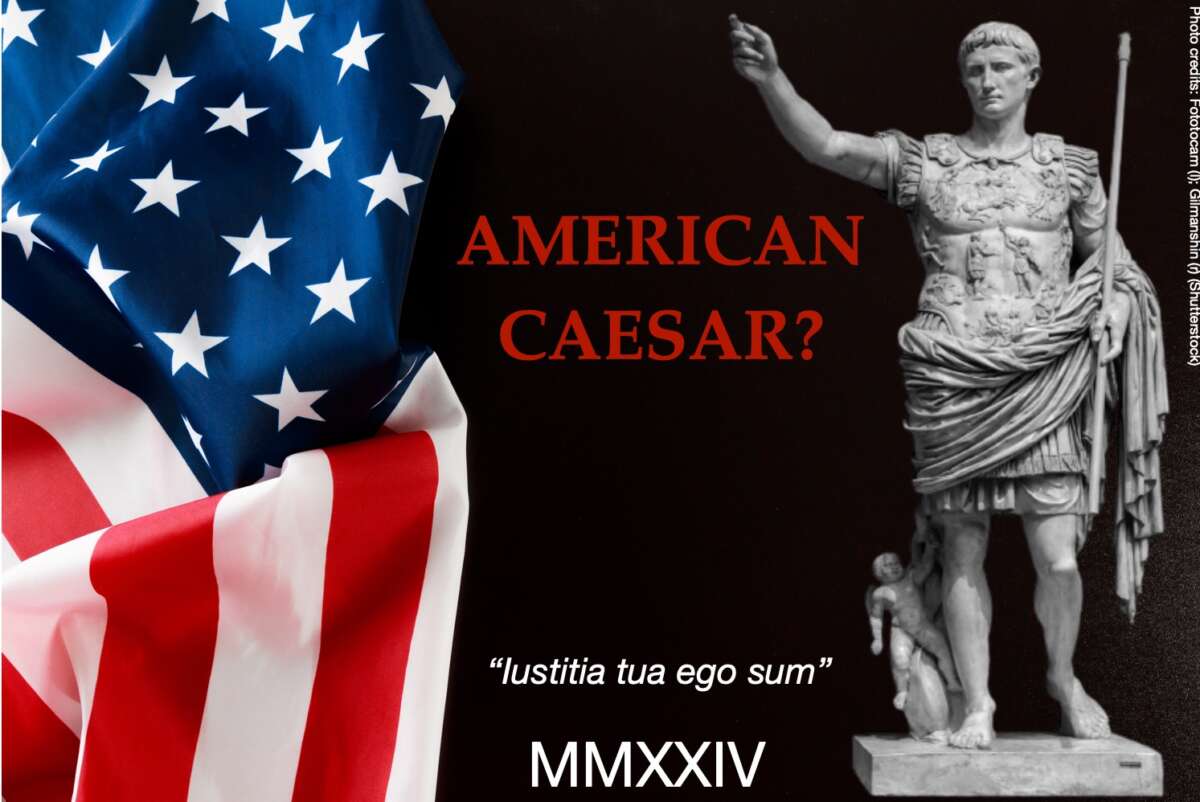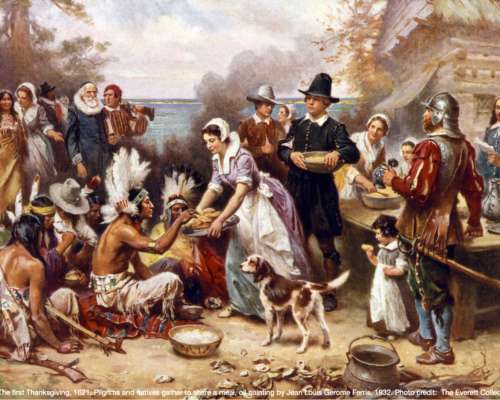
We are only a year away from what could be the most important election of our lives, and certainly of this century. At stake is perhaps the very existence of our Republic. The choices for the highest office of the land are horrible at the moment. One candidate is increasingly confused because of senility and the other appears to be incorrigible by nature. Be that as it may, there are sinister whispers in the wind that next year’s election for President may be the last Presidential election we have for many years. There is emerging talk of a “Red Caesar” and that talk is the topic of this post. The hypothesis floating around and suggested in print is that some citizens and factions on the extreme political right feel that the U.S.A. is in danger of imminent and catastrophic ruin at the hands of leftist and lawless elements in our country. These leftist factions in America are accused of undermining our institutions such as justice, law enforcement and religion, corrupting our schools with woke and gender politics and holding everything dear and sacred to many up for ridicule. People are living, injecting drugs, stabbing or shooting others and urinating and defecating on our streets. Violent crime against people and property is at record highs. Flash mobs of lawless individuals are stealing hundreds of thousands of dollars of merchandise causing retail stores to close in metropolitan areas. To members of the right, America is turning into a cesspool and something must be done before we reach a tipping point (if we have not already done so.)
Like the passengers on United Airlines Flight 93 on 9/11/2001, concerned citizens must rush the “cockpit” and wrestle control away from whatever villain has taken control before they perish according to the Red Caesar theory. The risk is that the plane might still crash as Flt 93 in fact did. But we need to at least try.
Many of these ultra conservatives see the need for a dictator unrestrained by the Constitution along the lines of Rome under Julius Caesar who, through sweeping and absolute power, will restore our Republic à la Caesar. To these distressed individuals, Donald J. Trump appears to be their best hope, and the end–in this case–justifies the means. The question then is whether we will have an American Caesar and what then becomes of our Republic? Our Constitution? Will we have political violence in our streets?
The very first Caesar: Gaius Julius
Between now and November 2024 you may hear or read about references to Julius Caesar crossing the Rubicon. What does this mean? The Rubicon was and is a small river north of Rome near the eastern coast of Italy. When Rome ruled the world, the Rubicon was thought of as the northern boundary of Italy. Roman law forbid any legion under the pain of death to its commander from crossing into Italy without the Senate’s approval. But Julius Caesar would have none of that. He marched his soldiers over the Rubicon bridge.

As soon as the last legionnaire stepped off the bridge, Caesar is reported to have said (at least in the movies):
“Here I abandoned peace and desecrated law; fortune it is you I follow. Farewell to treaties. From now on war is our judge!”
Why did Caesar decide to seize power in Rome? No doubt he was a well-intentioned patriot himself. He also was cognizant of Rome’s decay. According to PBS:
“By [this point in his life], Caesar was very successful, but he had many enemies and found his position and his life under threat. He believed the only way he could protect himself was by seizing power. In January, 49 BC, he led his troops across the Rubicon River into Italy and started [the] civil war.”
The rest is history and explained somewhat further below.
Republics and Democracies
John Adams, the second President of the U.S. once was asked in the year our Constitution was written to define the term “Republic.” He chose his words carefully. Adams defined a Republic as:
“. . . a government, in which all men, rich and poor, magistrates and subjects, officers and people, masters and servants, the first citizen and the last, are equally subject to the laws.”

Notice Adams says that all are equally subject to the laws. This means the rich and the poor, the powerful and the pale. Justice is blind. There are not separate standards. You don’t have democratic law or republican law. What is sauce for the goose is sauce for the gander. Elsewhere, Adams notes that the U.S. Constitution was written for a moral and religious nation. If not so, he warns: “Human passions unbridled by morality and religion . . . would break the strongest cords of our Constitution as a whale goes through a net.”Yet, whether America is either a moral or a religious nation today is a fair question. Perhaps this is part of the problem? Perhaps the cords of our sacred document are unraveling this very moment?
Republics generally have balanced government, usually separated into three branches. In our national past, senators were not voted on by the people, but chosen by the states they represented, perhaps appointed by the governor of their state. Because we have a democratic process in our Republic, the people often decide who wins a race. But not always. In the case of the Presidency, it is the Electoral College that ultimately decides. In some rare cases, it is the House of Representatives. When our laws are disrespected and our judicial branch ignored, it is the mob.
Like the U.S., Ancient Rome had a constitution with separation of powers and checks and balances, but it was not a constitution in writing as we have today. Writes Eric Posner, the son of the famous Appellate Court judge Richard Posner:
“The Roman Republic, which is conventionally dated from 509 to 27 B.C., had an unwritten constitution that controlled its political system. The constitution established a series of institutions (such as the senate) and offices (such as the two consulships), and defined their powers; it determined the rights of citizens and eligibility for citizenship; it addressed the role of religion in public life; it specified proceedings for lawmaking and adjudication. There was no formal amendment procedure, so constitutional norms changed frequently and often imperceptibly (as in Britain), and the constitution evolved a great deal over almost five hundred years. But there was a fair degree of continuity, and ancient authors recognized the difference between constitutional norms and other legal and political norms, making modern identification of a Roman constitution possible.”1
Posner and others compare the problems that Rome faced before Caesar became dictator in 46 BC with some of the same problems we have in the U.S. today; corruption, lawlessness, polarization of policy, immorality and issues and exceptions related to coveted Roman citizenship. There were also wars. In 73 BC Spartacus the slave rebelled. He was defeated in 71 BC. Before that. a Social War (in 91–87 BC) was waged where Rome fought with rival factions in Italy.
The founding of Rome
Originally, Rome was founded by twin boys, Romulus and Remus, who lived near present day Rome and, according to history, were suckled as infants by a she-wolf. Having grown to young manhood, each boy felt called to establish an empire. Romulus pushed his vision more vigorously than Remus, and Remus is thought to have been murdered at the hands of his brother or an associate of Romulus (the surviving brother for whom Rome was named.) Rome was founded on April 21, 753 BC when Romulus laid down the wall of Palatine Hill. All other events in the ancient western world were recorded as so many years before or after the founding of Rome.2
Having noted similarities between Rome and the U.S., Posner goes on to speak of how our country today is different than Rome was.
“The founders of the U.S. constitution were deeply knowledgeable about the constitution of the Roman Republic and heavily influenced by it. They accepted Polybius’s view that if a constitution is not balanced, the political system will degenerate into tyranny or mob rule . . . Fortunately, we have advantages that the Romans lacked—notably, a free press, a wealthy, educated citizenry, a robust party system, and a widely respected norm of political equality that extends throughout the entire population. These hard-won cultural endowments have taken up the slack left by the relaxation of the archaic system of checks and balances we have inherited from the Romans.”3
Yet, today our free press is attacked as the “enemy of the people” and some citizens believe that they are exempt from the law. The free press and other important institutions in our society are credited with raising alarms about not just far right extremists, but far left threats as well. The media are under attack from both sides. Alt-Right blogger Curtis Yarvin is not impressed, however, and his answer to the mainstream media is an iron fist:
“When [Trump NSC member Michael Anton who calls himself Publius Decius Mus] asks how Trump-Caesar should respond to Harvard, “The New York Times,” and the rest of the theocratic oligarchy blaring air-raid sirens about the imposition of dictatorship, Yarvin indicates that it would be essential to‘smash it‘with one blow. To suggest that Caesar should be required to deal with ‘someone else’s department of reality is manifestly absurd.’ Going on, Yarvin explains that ‘when Caesar crosses the Rubicon, he doesn’t sit around getting his feet wet, fishing. He marches straight across the Rubicon’ and uses ‘all force available.’ Once that happens, the whole world can be ‘remade.'”
In the words of Caesar, the die has been cast. Caesar must act, prevail, else he perishes.
Caesar does both. He prevails, but shortly after perishes. Like most dictators, Julius dies an ignoble demise only five years after seizing power when he is stabbed to death by a small group of people including Marcus Junius Brutus, a Roman General and personal friend of Caesar on March 15, 44 BC. Brutus was the ringleader of a conspiracy involving sixty Roman senators.
But while he was dictator, Caesar established many new colonies on land conquered by Rome and moved many of the impoverished citizens of the city to these remote outposts where they had a chance to prosper. He also conferred Roman citizenship on many inhabitants in these lands, reduced the number of slaves in the land and developed a new calendar which we still use today (the month of July is named for him and August is named for Caesar’s great nephew Augustus.) Gaius Julius Caesar did do great things, but did the end justify the means? The answer is “probably not” because Rome sunk ever lower under Caligula and Nero who followed as the city became increasingly metropolitan and the lower caste of workers were controlled by the races and the games in the Coliseum and the Circus.
The second Caesar: Adolph Hitler

From 1918 until 1933 Germany was governed as the Weimar Republic (or German Republic.) Germany had just lost World War I, a war which it was blamed for starting. Therefore, reparations were demanded by the victors for the death and destruction caused by Germany. In the early days of the Republic there was hyperinflation in Germany, where bags, boxes or bushels of paper money were needed to purchase simple grocery products such as bread and milk. Unemployment was high and the German people felt they were being unfairly punished for a war they could not have avoided. They felt utterly powerless.
The Nazis (Nationalsozialistische Deutsche Arbeiterpartei or National Socialist German Workers’ Party) formed in 1919 and one of its first members was a corporal named Adolph Hitler. On November 8, 1923 approximately two thousand Nazis marched on Munich and tried to overthrow the government, but they were outwitted by the authorities of the Weimar Republic and several days later Hitler was arrested, subsequently tried and imprisoned for treason. In the following decade, however, Hitler was released from prison and the influence of the Nazis grew, especially at the grassroots level. By 1933 they were a force to be reckoned with.
The appeal of the Nazis
On top of this, Germany was quick to feel the effects of the global depression following America’s economic collapse. This compounded the hardships that Germans faced on a daily basis.
“The guilt and economic collapse enraged the German population, feeling it a huge mark of shame on national pride. Such emotion, a Platonic viewpoint may claim, is conducive to political hysteria enabling a well-timed tyrant to capitalize on the will for strong leadership and violent retribution. We all know what happened next.”
Germans looked for scapegoats, some way to feel empowered again. Right wing propaganda from publications such as “Der Stürmer,” a weekly German tabloid-format newspaper published from 1923 to the end of World War II by Julius Streicher printed a continuous stream of hate, undermining the government and the democratic institutions of the Republic. There are commentators on AM radio in this country who have been accused of similar negative tactics, though it would probably not be fair to call them Nazis. Nevertheless, continual, unfair and unwarranted criticism of government institutions such as Congress, the Federal Bureau of Investigation, the Department of Justice, the Internal Revenue Service and so on usually has a corrosive effect on how the public perceives them.
Eventually, the answer to the concerns of ordinary Germans came from Hitler who said it was the antifa and the socialists in league with liberals and international Jewry that was to blame for Germany’s troubles. Germany was stabbed in the back by them. To angry and frightened Germans, Hitler was a messianic figure and Germans supported him in large numbers. The fact that he had been arrested and imprisoned did not deter his followers–it just made him more popular. He wore his rap sheet as a badge of honor. Hitler claimed he was persecuted by his political enemies and that only he could represent and defend those people who stood in solidarity with him. Only he could find jobs for them. Only he could restore German greatness, cut crime, and liberal rot.
Said a commentator:
“The fact that many Germans were attracted by the NSDAP was not only because of their party programme. The party radiated strength and vitality. Moreover, the Nazi leaders were young, quite unlike the greying politicians of the established parties. In addition, Hitler’s image as a strong leader appealed to people. He was all set to unite the population and put an end to political discord.
The Nazis focused on voters from all walks of life, rather than on just one group, such as the workers or Catholics. They also attracted many people who had never voted before.“
Hitler became Chancellor in 1933. It would be the last election Hitler had to worry about. Politicians and political observers in the U.S. shrugged it off, however. As one news story reported it:
“Washington, Jan. 30 — High authorities here regard with complacence Adolph Hitler’s rise to power in Germany.
Official comment was withheld on his appointment today on the ground that it was an internal German affair. But several authorities indicated they had faith that Hitler would act with moderation compared to the extremist agitation on his recent election campaigning much of which was regarded outside Germany as highly ‘inflammatory.'”
The third Caesar Donald J. Trump
We see this complacency today as people discount what Donald J. Trump promises should he be re-elected. Take for example, Trump’s threats addressed to senior military officers. Neither Hitler nor Trump had any use for their Generals. Perhaps they found senior officers to be intimidating? Or the generals knew better than to act on their Leader’s whims. Trump suggests certain retired general officers would have in olden days been court-martialed or put to death for treason.4 When have you ever heard a Democratic President talk this way?
How might this happen?
According to Curtis Yarvin, a libertarian <alt> right blogger who founded the Dark Enlightenment, movement, said to be a neofascist:
“The trick . . . is for the would-be American Caesar to exercise emergency powers from day one. How? Caesar should run for president promising to do precisely this, and then announce the national emergency in his inaugural address, encouraging every state government to do the same. Taking advantages of ‘ambiguities’ in the Constitution, he will immediately act to federalize the national guard around the country and welcome backup from sympathetic members of the police (who will wear armbands to signal their support for Caesar).
When federal agencies refuse to go along, Yarvin suggests, Caesar (whom he now begins referring to as ‘Trump’) will use a ‘Trump app’ to communicate directly with his 80 million supporters on their smart phones, using notifications to tell them that ‘this agency isn’t following my instructions,‘“‘ which will prompt them to rally at the proper building, with the crowd ‘“‘steered around by a joystick by Trump himself,‘ forming a ‘human barricade around every federal building, supporting Trump’s lawful authority.’ Where maybe 20,000 people stormed the Capitol on Jan. 6, millions responding to the Trump app would be much more effective —a modern-day version of the paramilitary groups that ensured Lincoln’s safety during the hard-fought, dangerous 1860 campaign for president that preceded the Civil War (and the president’s subsequent suspension of habeas corpus and shuttering of hundreds of newspapers).“
This sounds like a game or an abstract exercise, but these sorts of simulations are how things are planned. Am I comparing Donald Trump to Julius Caesar or Adolph Hitler. Not directly, I hope, at least as far as Hitler goes. But I do see a common leaning towards authoritarianism and against the rule of law in both Hitler and Trump. I also see the public approval from the masses as empowering and emboldening them to do reckless things. I think Trump brings much more self-interest to the table than Caesar or Hitler did. I don’t see Hitler as consumed with money and the perks of office like I understand Trump is. But for those elements currently in America that want to overthrow the government in favor of a racially white, sexually straight, capitalist populace paying lip-service to God, Trump is their man. He even has the Evangelicals fooled.
This is the bottom line

To summarize, there are some conservative citizens, authors, former White House staff members and institutions today–no doubt patriotic and well-meaning–who seem to believe that the U.S. is no longer a Republic and is in a state of collapse. This is perhaps because of hundreds of thousands of people flooding across the borders, because of crime in the streets, inflation, cultural issues, creeping socialism, network news, crises in public education, critical race theory, and fears of whatever conspiracy conservatives think liberals may be plotting. These conservatives see a need for a “reset” or reboot that can only be accomplished by a dictator who necessarily suspends the U.S. Constitution and Congress with the goal of eventually restoring them. They believe such as “reset” occurs every 75 years or so and came under Washington, Lincoln, FDR and is now overdue. This is possibly the event that Q referred to as the “Storm.” Were this to happen, we could lose our Constitutional rights such as life, liberty, property, speech, etc. This Caesar may well be Donald J. Trump since a landslide victory in 2024 (or not) would give him a mandate for change. Were he fairly defeated, we might confidently expect Trump to lead an attempt to seize power as we saw on January 6, 2021 and he appears to have the temperament and disregard for traditional, established law and process.
Plato’s critique of democracy
We get our earliest theoretical framework on democracy from Plato. However, Plato was not particularly keen on democracy. In his work “The Republic,” Plato delivers a “damning critique of democracy that renders it conducive to mass ignorance, hysteria and ultimately tyranny” according to Author Liam Jones. Jones reminds us of the utter contempt Plato had for democracy:
“Plato believed that expertise is the critical attribute of a leader; He criticizes democracy of seldom producing such characters. Rather, it elects popular spinsters who are effective in manipulating popular opinion.”
Plato compares the leader of a democratic country to a captain navigating a ship. He believes that there are indispensable qualifications that are needed in order to successfully complete a voyage, thus, so a nation. Plato notes;
“… the true navigator must study the seasons of the year, the sky, the stars, the winds, and all the other subjects appropriate to his profession if he is to be really fit to control the ship…[the electorate] think that it’s quite impossible to acquire the professional skill needed for such control and that there’s no such thing as the art of navigation.“
Therefore, under democratic principles, that captain (and captain) can be voted out of his command in favor of someone who knows nothing about the sea, the stars and sailing in general. The navigator’s replacement could be someone who paid for the privilege of serving as captain, or who threatened or intimidated the crew to vote for him. It could be something as capricious as the roll of the dice. And, using historical precedents5, Plato says that there is a certain hysteria involved with democracies, a sort of group-think or mob mentality:
“An excessive desire for liberty at the expense of everything else is what undermines democracy and leads to the demand for tyranny.”
U.S. Supreme Court Chief Justice John Roberts in his 2019 End-Of-the-Year report to the federal judiciary said:
“Civic education, like all education, is a continuing enterprise and conversation. Each generation has an obligation to pass on to the next, not only a fully functioning government responsive to the needs of the people, but the tools to understand and improve it.”
The importance of virtue in a Republic
Dr. Benjamin Franklin listed twelve virtues needed for the Constitution to take root in the hearts of our citizens. These virtues were: temperance, silence, order, resolution, frugality, industry, sincerity, justice, moderation, cleanliness, tranquility, chastity, and humility. Temperance refers to self-restraint. It means not taking the law into your own hands or not being provoked into a fight. Silence is important because it indicates you are reflecting, listening to others rather than trying to control the debate yourself. The virtue “order” implies there are rules in society to which you submit yourself. To children, it means waiting for your turn, following instructions and so on. Resolution reflects a determination to see things through. Frugality suggests being thrifty, moderate rather than ostentatious or lacking self-control. Industry refers to the process of work through which we discover dignity. Sincerity means being able to take others at their word and being true to your own vows and promises. Justice means that people are treated with equal fairness and punishment for misdeed are applied to all. The virtue “moderation” is similar to temperance. It means we should be balanced in what we do, not going overboard for one thing or another. Cleanliness is a norm in most societies and particularly in a Republic where there are minimum expectations.
The Constitutional Convention of 1787 was held in secret. Representatives were present from twelve of the thirteen states. There were many disagreements between the delegates of the several states, but they were able to compromise for the sake of creating this great nation. Today, compromise is considered by some politicians as immoral. But politically it is absolutely necessary to get things accomplished. Tranquility is a mood of your spirit where you are at peace with yourself and with others. Chastity refers to abstention of unlawful sexual intercourse. Humility is when you understand that there is something or someone greater than you and you understand that you are subject to this person. In some ways, humility is the opposite of pride.
There is no way for government to legislate morality, to force people to appropriate these virtues. In some countries such as Iran, women who as seen as unchaste because of their western dress are beaten. Is this what we want in the U.S.? So, if a fundamental reform is needed to restore our Republic, it must begin with us, in our hearts. If as Adams say religion and morality are needed for the Constitution to be respected and followed, then we must conduct ourselves accordingly.
Franklin understood these virtues do not come easy, and he recommended that a person try to master them one at a time. But as you read over these, try to think of examples of how these virtues are being ignored or misapplied, and how much our society would be different if most or all of us applied these virtues. Imagine how different our present day Congress would be?
When Franklin left Constitutional Hall for the last time, he was asked what sort of government the United States now had. He thought for a moment and then replied: “A Republic if you can keep it.” Adam J. White, writing in The Atlantic, continues:
“What does it take to “keep a republic”? Nearly two and a half centuries into this experiment in self-governance, Americans tend to think that they keep their republic by relying on constitutional structure: separated powers, federalism, checks and balances. But constitutional structure, like any structure, does not maintain itself. Each generation has to maintain its institutions and repair any damage that its predecessors inflicted or allowed. This task begins with civic education, so that Americans know how their government works, and thus what to expect from their constitutional institutions.”
That response from Franklin remains as relevant today as it was back then.
FOOTNOTES
1Eric Posner, “The Constitution of the Roman Republic: A Political Economy Perspective” (John M. Olin Program in Law and Economics Working Paper No. 540, 2010).
2In Greece, Olympiads were often used. An Olympiad was four years in length with 776 BC as Year One.
3Eric Posner, “The Constitution of the Roman Republic: A Political Economy Perspective” (John M. Olin Program in Law and Economics Working Paper No. 540, 2010).
4Representative Paul Gosar (R-AZ) was more specific on General Miley’s proposed fate, saying he should be hung.
5“The ‘Mytilenian Debate’ in Athens, 427bc, stands as a flagrant example of this hysteria. Reported in Thucydides’ book the History of the Peloponnesian War, the Athenian assembly, scared of further revolt, hastily sentenced all of the male citizens of the rebellious city-state Mytilene to death, while the women and children would be sold into slavery. Realizing the unprecedented brutality of their decision, it was overturned the very next day.



